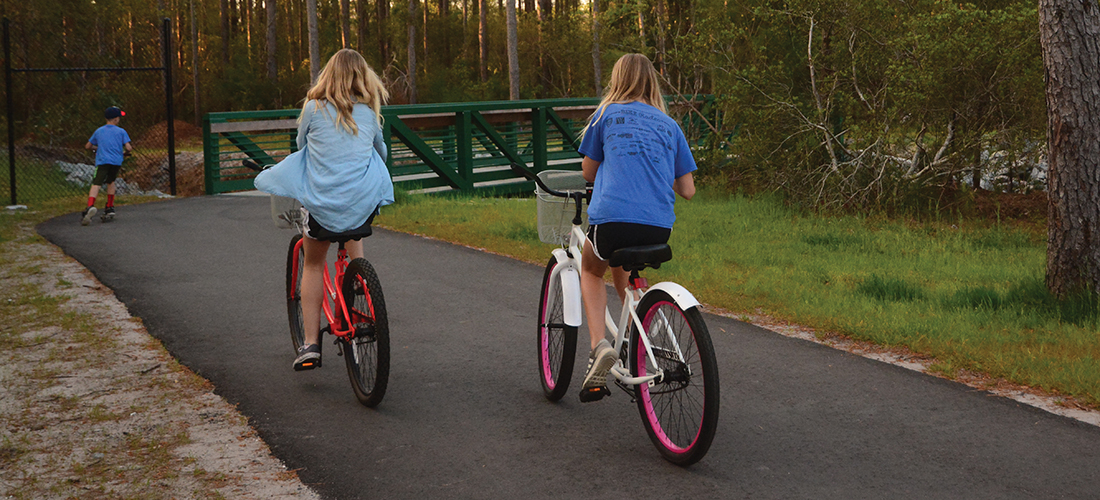Case Unclosed
In her gripping new documentary, filmmaker Jacqueline Olive explores a young man’s mysterious death and terrorism in our own backyards
By Dana Sachs
Jacqueline Olive: Filmmaker
Your documentary film, Always in Season, won the Special Jury Prize for Moral Urgency at this year’s Sundance Film Festival. How would you describe the film to people who haven’t seen it?
It’s a feature film that explores the scope of lynching terrorism and connects that history to racial violence today. The film interweaves three stories: the death of 17-year-old black teenager, Lennon Lacy, who was found hanging from a swing set in Bladenboro, North Carolina, in 2014; the group of re-enactors in Monroe, Georgia, who dramatize the events surrounding a quadruple lynching in 1946; and another historic lynching case, which took place in Mariana, Florida, in 1934.
What made you decide to focus on Lennon Lacy’s case?
Well, the first thing is that my son was 17, Lennon’s age, when I heard about it. As a mother, I couldn’t imagine what Lennon’s mother, Claudia, was going through. As a country, we had been living with the police killings of unarmed black and brown people. We’d been living with vigilante killings, like Trayvon Martin and Jordan Davis. And it’s such trauma, particularly for black people. I couldn’t imagine how a mother could be facing the possibility that her son had been lynched. I had already been looking at historic lynchings. The more I talked to Claudia, the more I started to realize that there were thematic parallels to the communities where I’d already been filming.
What kinds of parallels?
For example, by the time I reached out to Claudia, she was already trying to get an FBI investigation opened. Within just a few days of his death, the police decided that Lennon committed suicide, without looking closely at the circumstances. The fact that there was very little regard for the possibility that it might have been a lynching just really concerns me, because it echoes the way historic incidents of lynching were more often than not just swept under the rug without a proper investigation. Including this case in the film has never just been about whether or not Lennon was lynched. It’s about the community’s right to have his case investigated thoroughly given the racial climate in Bladenboro and the history of lynching in this country.
Are you saying that if circumstances suggest lynching as a possibility, then a case like this should be more thoroughly investigated?
Absolutely. There’s no reason why the family should have even had to have a conversation about that. There’s a young man found hanging publicly. And the family says that he wasn’t suicidal. That should be enough to trigger a proper and thorough investigation.
You grew up in Mississippi. What did you hear about lynching as a child?
For black people in the South, the stories just go so far back. For older generations, the pain and trauma of lynching — as was the case for Jews about the Holocaust — means that people don’t really talk a lot about the details. So I don’t remember any overt messages, but I was clear about the terrorism and about the violence. Like the woods, for example. I grew up in a cul-de-sac and behind my house were woods. Mixed in with the beauty was understanding that there was terrorism that happened there.
That’s one of the things I tried to layer the film with — what it feels like to live in the South. You have such contradiction. You have this friendliness, and these geographical spaces that are beautiful and alluring, and at the same moment you have these power dynamics and institutions that are de-humanizing, and this history of racial terror. It all happens at the same time. The whole point of the film is to understand the details. When you understand the details, you don’t just have this vague, fuzzy notion of terror. We have clarity when we start to look at the history, and then we have clarity about what’s actually going on with our communities.
Would you say that, as a filmmaker, you want to tell stories about people of color because they’ve been overlooked?
That’s right. And also because I’m a person of color. I understand the nuance. I understand how dynamic our lives are and how cinematic they can be.
What do you mean by “dynamic” and “cinematic”?
You can often see people of color in roles that are stereotyped. That’s one. And also, for example, particularly after the last presidential election, there’s been a lot of conversation on the coasts, about wanting to understand life in rural areas and in the South in particular. And they often mean white people, but there are also actually a lot of people of color living in rural areas, too. Our stories are not told often enough and when they are, they’re not given the same layers and the same complexity.
Why is it important to diversify the field of filmmaking?
Filmmakers of color can see the nuances more quickly. They can bring in many, many layers, consciously and unconsciously, all at the same time. The other thing that I think is really important is that we understand the American story more fully. We see all of those avenues that most people are not encouraged to look at, like what poverty looks like, or what joy for people of color looks like. There is a standard, and a narrative, that really excludes that. As a person of color, I absolutely have to understand what mainstream society is like, and I also have to understand the margins.
You talk of “dehumanization.” Where do you see that?
I’ll talk about Wilmington, for example. With the Jervay Housing Project off Dawson Street, that community is designed so that people drive past it. That’s not a neighborhood with streets that you can drive through in the same way that I can drive through, say, the neighborhoods at 23rd and Princess. There are few ways in unless you’re very specifically going to go to that community and that means that, unless you’re deliberate, you can drive past the people and miss their stories and the nuance of how they are naturally a part of Wilmington’s narrative.
And what does that mean to you?
If that’s how other people like to live — in an open community — why aren’t streets set up that way for people who live in Jervay? These institutions are inequitable racially. It’s true in housing. It’s true in education — look at our public schools and the rate of segregation. But the encouraging thing is that we can change them. If we’re really about doing the work of racial equality, then it’s not just about programs that we set up, or who we donate to. It’s about changing institutions as we interact with them. So, if your child is in a school, or you’re living near a school, that you know has issues of inequity, then it’s your responsibility to help make that school better. The encouraging thing is we can actually can do something to improve these institutions.
When you say “we,” who do you mean?
All of us. Everyone.
Dana Sachs’ latest novel, The Secret of the Nightingale Palace, is available at bookstores, online and throughout Wilmington.


